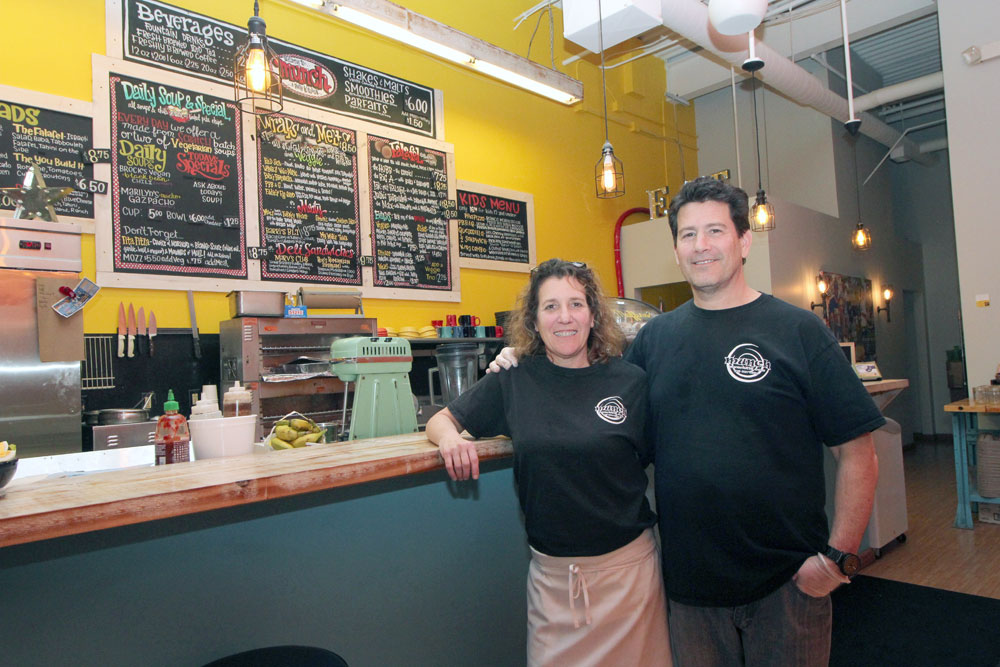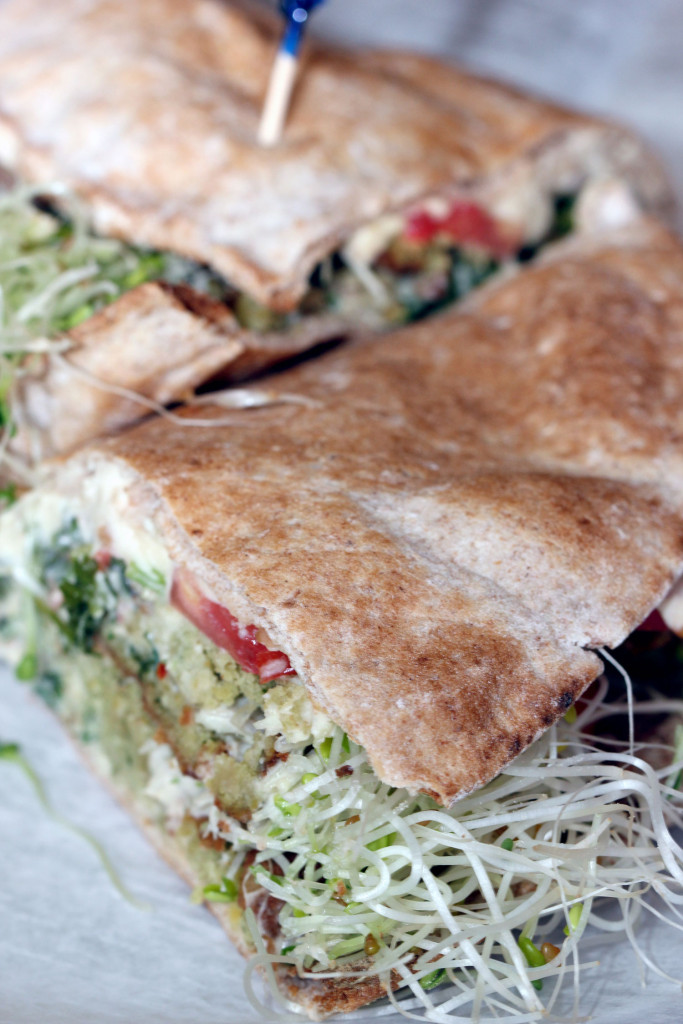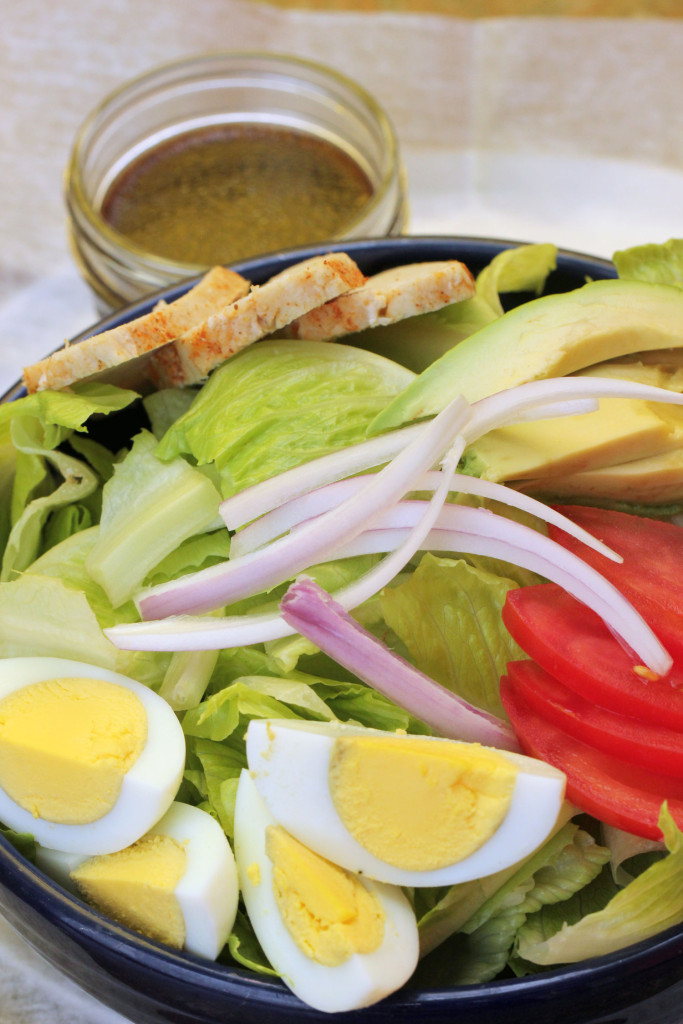Scott and Jamie Hersch’s Munch is in a new location, but the couple’s approach to serving fresh and healthy food remains the same

Customers can choose from a sizeable menu at Jamie and Scott Hersch’s restaurant, Munch, at 28500 Miles Road in Solon.
Story by Amanda Koehn
Photography by Michael C. Butz
About twice a week, Scott Hersch drives early in the morning from his Solon home to the Northern Ohio Food Terminal on the outskirts of downtown Cleveland, where he has a detailed list of produce to pick up. For Hersch, making the drive is a reasonable price to pay for ingredients he knows haven’t been sitting in a distributor’s warehouse for a week or longer.
“I’m getting fresher stuff, I’m getting it at a better price and I’m able to pick it,” he says.
Alas, when you walk into Munch, the café-style, “flexiterian” (mostly vegetarian but includes some meat) Solon restaurant Hersch owns with his wife, Jamie, the brightly painted walls covered with local artists’ work fittingly complement the colorful pita pizzas, salads and soups – made with ingredients chosen for their exact ripeness and color.
While neither of the Hersches started out as chefs and have had a somewhat winding path toward their new location, in the past year their healthy and colorful dishes have put them on their way to solidifying their place in the culinary community.
Lick’s, Schticks and Munch

Julie’s Tabbouleh, a falafel sandwich with hummus, mixed bell peppers, tabbouleh, sunflower seeds, tahini and sprouts.
Scott Hersch, 54, became a chef somewhat by accident. A Beachwood native who attended the former Heights Temple in Cleveland Heights, which later transitioned to B’nai Jeshurun Congregation in Pepper Pike, he started cooking in 1991 when his sister owned a “greasy spoon” restaurant called Lick’s on the Case Western Reserve University campus in Cleveland. After Lick’s closed in 1992, he kept in touch with administrators at CWRU and was eventually hired to open a kosher restaurant for its Hillel program in 1997 – which also turned out to be short lived but led to a new opportunity.
”In the same month that they wanted us to leave, the dean of the law school asked us to move to the school,” he says.
The restaurant was known as Schticks.
Jamie Hersch, a Shaker Heights native who attended The Temple-Tifereth Israel in Beachwood as a child, meanwhile, had been a teacher, waited tables and was working at a now-defunct food service distributor called Ohio Farmers when she met Scott. She was in charge of opening up his account.
“I went to open up his account and moved in a week later and we’ve been married 13 years,” she says, adding they both previously lived in Israel in 1986 but never crossed paths.
Jamie Hersch, 50, spent about five years as a stay-at-home mom raising the couple’s two children – Simon, 12, and Ruthie, 11 – then worked at Trader Joe’s in Woodmere before finally deciding to work with Scott at Schticks.
“We seem to work well together. We actually like each other, so it’s easy for us,” she says.
About three years ago, the Hersches began making some changes. First, they changed the name of their eatery from Schticks to Munch, which Jamie says is because some employees couldn’t say the name correctly to customers.
“We wanted to make it simple,” she says.
They also began to feel bogged down by not being allowed to advertise the restaurant due to an agreement that stipulated the restaurant was primarily for law students. Moreover, business would drop by 80 percent when classes weren’t in session.
“We were tired of being so hidden, we were tired on not having business all December, because (the students) were on break, and all summer,” Jamie Hersch says. “(The law school was) ready for a change, we were ready for a change.”
They officially moved Munch to Solon – half a mile from their home – in December 2015.
Fresh food philosophies

Munch’s Cobb salad with eggs, tomato, chicken and avocado, served with a house-made balsamic vinaigrette.
Munch’s menu mirrors the “mostly vegetarian” Hersches’ palate. Both were strictly vegetarian for some time before eventually shifting slightly toward eating meat – and their restaurant, despite relying heavily on fresh produce, offers meat-friendly dishes.
However, Scott Hersch’s start in making kosher food helped them develop an understanding of how to create prominent flavors via a variety of ingredients, many meat-free. Also, every Munch soup is made vegetarian, so customers never have to question the type of stock used – a common problem for vegetarians eating out. Thus, the restaurant is popular among that crowd.
They also believe in making small batches of everything so food is as fresh as possible, which he says requires “constant shopping, constant prepping.”
“I think with our food we have somewhat of a purpose of wanting people to eat healthier,” Scott Hersch says.
While Munch’s dishes – like its hearty salads, wraps and salad/sandwich combos – often include Middle Eastern staples like hummus, tabbouleh and baba ghanouj, both Hersches say their time spent in Israel influences their home cooking more than the restaurant’s menu.
“We’ll do brisket at home, we’ll do like stuffed cabbage,” Jamie Hersch says.
She acknowledges one challenge of Munch’s suburban location is that it’s not in a “walking community,” thus they rely on more traditional forms of advertising and word-of-mouth to get the message out about their restaurant. That said, moving to Solon has allowed them to be more connected. The Hersches now do more fundraising, catering and donations than they had an opportunity to do while at CWRU.
Though the Hersches plan to continue expanding their customer base and growing Munch’s presence in the region, they do have at least one break from their busy restaurant lives planned for later this year: a trip to Israel to celebrate their children’s b’nai mitzvah.
“We just thought that would be a great experience for them,” says Jamie Hersch, who lived on a kibbutz for a year after high school.
Moreover, Jamie and Scott Hersch say that although their food has a certain aspect of simplicity, they focus on taking the time to explain ingredients and dishes to new customers – in which their deep knowledge of where the food comes from helps.
“I know everything that is in everything,” Scott Hersch says. js
